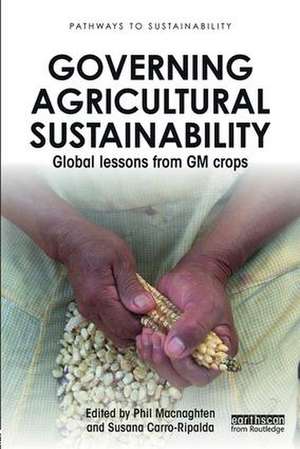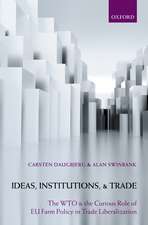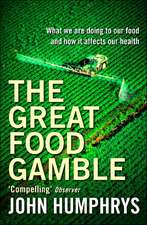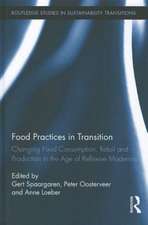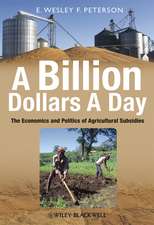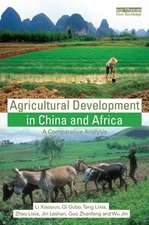Governing Agricultural Sustainability: Global lessons from GM crops: Pathways to Sustainability
Editat de Phil Macnaghten, Susana Carro-Ripaldaen Limba Engleză Paperback – 9 iul 2015
This book aims to understand these dynamics, examining the impacts of GM crops in diverse contexts and their potentials to contribute to sustainable agricultural futures. Part 1 draws on research from three global ‘rising powers’ – Brazil, India and Mexico – exploring the views of scientists, farmers and publics. Using a diverse array of ethnographic and qualitative methodologies, the book examines the dynamics that have underpinned the controversy in three diverse geo-political contexts, the manner in which dominant institutional framings have been closely aligned with the interests of powerful elites, and the multiple ways in which these have been resisted through local, symbolic and material practices. Part 2 comprises a series of short comment pieces from 11 leading social and natural scientists responding to the question of how to develop a policy framework for the responsible innovation of sustainable, culturally appropriate and socially just agricultural GM technologies.
This innovative book offers new insights for researchers and postgraduates in Science and technology studies, Agro-ecology and Environmental Studies, Development studies, Anthropology, Human Geography, Sociology, Political Science, Public Administration, Latin American studies, and Asian studies.
| Toate formatele și edițiile | Preț | Express |
|---|---|---|
| Paperback (1) | 275.26 lei 6-8 săpt. | |
| Taylor & Francis – 9 iul 2015 | 275.26 lei 6-8 săpt. | |
| Hardback (1) | 1001.07 lei 6-8 săpt. | |
| Taylor & Francis – 13 iul 2015 | 1001.07 lei 6-8 săpt. |
Din seria Pathways to Sustainability
-
 Preț: 257.71 lei
Preț: 257.71 lei -
 Preț: 266.11 lei
Preț: 266.11 lei -
 Preț: 256.68 lei
Preț: 256.68 lei -
 Preț: 169.51 lei
Preț: 169.51 lei -
 Preț: 275.30 lei
Preț: 275.30 lei -
 Preț: 323.23 lei
Preț: 323.23 lei -
 Preț: 485.40 lei
Preț: 485.40 lei -
 Preț: 317.30 lei
Preț: 317.30 lei -
 Preț: 273.35 lei
Preț: 273.35 lei -
 Preț: 240.16 lei
Preț: 240.16 lei -
 Preț: 274.20 lei
Preț: 274.20 lei -
 Preț: 320.20 lei
Preț: 320.20 lei - 26%
 Preț: 762.97 lei
Preț: 762.97 lei -
 Preț: 272.37 lei
Preț: 272.37 lei -
 Preț: 319.43 lei
Preț: 319.43 lei -
 Preț: 273.57 lei
Preț: 273.57 lei -
 Preț: 322.27 lei
Preț: 322.27 lei -
 Preț: 274.45 lei
Preț: 274.45 lei - 17%
 Preț: 213.33 lei
Preț: 213.33 lei -
 Preț: 244.02 lei
Preț: 244.02 lei -
 Preț: 469.56 lei
Preț: 469.56 lei -
 Preț: 317.48 lei
Preț: 317.48 lei -
 Preț: 317.30 lei
Preț: 317.30 lei -
 Preț: 363.96 lei
Preț: 363.96 lei -
 Preț: 314.21 lei
Preț: 314.21 lei
Preț: 275.26 lei
Nou
Puncte Express: 413
Preț estimativ în valută:
52.69€ • 57.25$ • 44.29£
52.69€ • 57.25$ • 44.29£
Carte tipărită la comandă
Livrare economică 22 aprilie-06 mai
Preluare comenzi: 021 569.72.76
Specificații
ISBN-13: 9781138891821
ISBN-10: 1138891827
Pagini: 262
Ilustrații: 7 black & white illustrations, 4 black & white tables, 3 black & white halftones
Dimensiuni: 156 x 234 x 15 mm
Greutate: 0.39 kg
Ediția:1
Editura: Taylor & Francis
Colecția Routledge
Seria Pathways to Sustainability
Locul publicării:Oxford, United Kingdom
ISBN-10: 1138891827
Pagini: 262
Ilustrații: 7 black & white illustrations, 4 black & white tables, 3 black & white halftones
Dimensiuni: 156 x 234 x 15 mm
Greutate: 0.39 kg
Ediția:1
Editura: Taylor & Francis
Colecția Routledge
Seria Pathways to Sustainability
Locul publicării:Oxford, United Kingdom
Public țintă
PostgraduateCuprins
Part 1: The GMFuturos Research 1. Researching GM Crops in a Global Context 2. An Analysis of the GM Crop Debate in Mexico 3. An Analysis of the GM Crop Debate in Brazil 4. An Analysis of the GM Crop Debate in India 5. Comparing GM Crops in Mexico, Brazil and India Part 2: Commentaries on Governing GM Crops 6. The Route to Food Security is not Through Glorification of the Rural Idyl and Demonization of Global Trade (or Vice Versa) 7. Lessons from China’s GM Controversy 8. Public Participation, Accountability and the Stewardship of Transgenic Crops 9. An Anthropological Perspective on the Promise and the Threat of GM Crops 10. Neoliberal Origins of Anti-GM Protest in Europe 11. GM Futures: Perspectives from a Plant Molecular Biologist 12. The Search for Affirming Narratives for the Future Governance of Technology: Reflections from a Science–Theology Perspective on GMFuturos 13. Crop Science, the Heisenberg Principle and Resistance to Genetically Modified Organisms 14. Innovating Governance? 15. Institutional Rigidities and Impediments: Agricultural Research and GM Crops in India 16. Focus–ing on GM Crops 17. A Responsible Innovation Governance Framework for GM Crops: Global Lessons for Agricultural Sustainability
Recenzii
"Distilling a decade of research at UK institutions, this wide-ranging collection wisely shifts our attention from the disputed technical properties of GM crops to the kinds of politics needed to accommodate GM agriculture on a global scale. If one book could prod the GM debate out of its current sterile stalemate, then this would be it." –Sheila Jasanoff, Pforzheimer Professor of Science and Technology Studies, Harvard Kennedy School, USA
"Can GM crops feed the world? Such an apparently straightforward question is revealed in this book instead as a lens on the daunting intersections of technological advance, globalization, political and economic power, and cultural identity. Through the subtle studies in this volume, GM crops become nothing less than a powerful and poignant metaphor for whatever it is that seems to have replaced the ruthless innocence of modernity."–Daniel Sarewitz, Professor of Science and Society and Co-Founder and Co-Director of the Consortium for Science, Policy & Outcomes (CSPO) at Arizona State University, USA
"A fascinating and unique book addressing the development and deployment of GM crops in a wide variety of different agroecosystems and countries. It steers between the unhelpful dichotomies of the past, and shows that GM agriculture is neither inevitably a good thing or a bad thing: it depends on the social, ecological and political circumstances."–Jules Pretty OBE, Deputy Vice-Chancellor and Professor of Environment & Society at the University of Essex, UK
"The quest to document, to make sense of and to advocate solutions to the continuing controversies surrounding genetically modified crops has spawned a large library of literature. This edited but integrated volume both contributes to that discussion and extends it in new directions. Rather than starting with an analysis of the claims and counterclaims for GM crops, it asks why such crops have not been viewed as a universal public good. In asking that question, it moves beyond the endless polemics and identifies how and under what conditions GM crops might be widely accepted. Moreover, by focusing on Mexico, Brazil and India – three nations where empirical research has been limited – the authors show how these technologies are framed differently in different settings. In so doing the authors illustrate the limits of both the information deficit model and formal risk analysis as means for resolving controversies. In their place, the authors present an alternative pluralistic and inclusive model for decision making – a model that just might move us toward better governance of technological change. Scholars and decision makers concerned about public controversies surrounding technological change would do well to read this volume."–Lawrence Busch, University Distinguished Professor at Michigan State University, USA
"Can GM crops feed the world? Such an apparently straightforward question is revealed in this book instead as a lens on the daunting intersections of technological advance, globalization, political and economic power, and cultural identity. Through the subtle studies in this volume, GM crops become nothing less than a powerful and poignant metaphor for whatever it is that seems to have replaced the ruthless innocence of modernity."–Daniel Sarewitz, Professor of Science and Society and Co-Founder and Co-Director of the Consortium for Science, Policy & Outcomes (CSPO) at Arizona State University, USA
"A fascinating and unique book addressing the development and deployment of GM crops in a wide variety of different agroecosystems and countries. It steers between the unhelpful dichotomies of the past, and shows that GM agriculture is neither inevitably a good thing or a bad thing: it depends on the social, ecological and political circumstances."–Jules Pretty OBE, Deputy Vice-Chancellor and Professor of Environment & Society at the University of Essex, UK
"The quest to document, to make sense of and to advocate solutions to the continuing controversies surrounding genetically modified crops has spawned a large library of literature. This edited but integrated volume both contributes to that discussion and extends it in new directions. Rather than starting with an analysis of the claims and counterclaims for GM crops, it asks why such crops have not been viewed as a universal public good. In asking that question, it moves beyond the endless polemics and identifies how and under what conditions GM crops might be widely accepted. Moreover, by focusing on Mexico, Brazil and India – three nations where empirical research has been limited – the authors show how these technologies are framed differently in different settings. In so doing the authors illustrate the limits of both the information deficit model and formal risk analysis as means for resolving controversies. In their place, the authors present an alternative pluralistic and inclusive model for decision making – a model that just might move us toward better governance of technological change. Scholars and decision makers concerned about public controversies surrounding technological change would do well to read this volume."–Lawrence Busch, University Distinguished Professor at Michigan State University, USA
Descriere
Informed by rich, ethnographic research with farmers, scientists and publics in three global rising power settings – Brazil, India and Mexico – this book provides a fresh understanding on how GM crops are being experienced in different locales, on why the controversy has taken varied forms internationally and by what pathways to move towards more sustainable agricultural technologies. It offers a new pathway to governing GM crops informed by recent debates on responsible innovation, agricultural sustainability and social justice.
